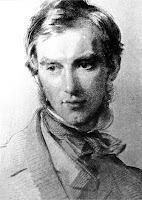
Joseph Dalton Hooker was arguably the most important British botanist of the nineteenth century. A traveller and plant-collector, he was one of Charles Darwin’s closest friends and eventually became director of Britain’s Royal Botanic Gardens Kew.
Hooker was born at Halesworth, Suffolk, on 30 June 1817.
He was a botanist and traveller. He was the youngest son of Sir William Jackson Hooker and his wife Maria, daughter of Dawson Turner.
He was educated at Glasgow High School and later at Glasgow university, where he graduated M.D. in 1839.
Hooker’s passions for botany and travel were combined when he was appointed assistant surgeon aboard HMS Erebus, which commanded by Sir James Clark Ross, and accompanied by its sister ship, the Terror was to spend four years exploring the southern oceans. The ships took shelter from Antarctica’s winters in places such as New Zealand and Van Diemen’s Land (Tasmania), and also visited the numerous tiny islands around Antarctica. These included Kerguelen’s Land, where the sojourns ashore allowed him to collect plants in relatively unexplored regions.
Hooker was born at Halesworth, Suffolk, on 30 June 1817.
He was a botanist and traveller. He was the youngest son of Sir William Jackson Hooker and his wife Maria, daughter of Dawson Turner.
He was educated at Glasgow High School and later at Glasgow university, where he graduated M.D. in 1839.
Hooker’s passions for botany and travel were combined when he was appointed assistant surgeon aboard HMS Erebus, which commanded by Sir James Clark Ross, and accompanied by its sister ship, the Terror was to spend four years exploring the southern oceans. The ships took shelter from Antarctica’s winters in places such as New Zealand and Van Diemen’s Land (Tasmania), and also visited the numerous tiny islands around Antarctica. These included Kerguelen’s Land, where the sojourns ashore allowed him to collect plants in relatively unexplored regions.
When the Erebus returned to England in 1843, Hooker needed to establish his reputation and find paid, botanical employment. Two years earlier, his father had been appointed first director of the Royal Botanic Gardens at Kew, which had just been brought under government control. However, while the prestigious appointment brought William Hooker to the centres of scientific life in London, it reduced his income and he was still unable to give his son much financial support. Fortunately William’s influence was sufficient to secure an Admiralty grant of £1000 to cover the cost of the Botany of the Antarctic Voyage’s plates, and Joseph received his Assistant Surgeon’s pay while he worked on it. The book eventually formed six large volumes: two each for the Flora Antarctica, 1844–47; the Flora Novae-Zelandiae, 1851–53; and the Flora Tasmaniae, 1853–59. Nonetheless, Hooker’s Antarctic publications never made any money and much of his time in the 1840s was taken up with searching for paid employment. In 1845, he was a candidate for the chair of botany at the University of Edinburgh. After failing to win the professorship, his father’s contacts helped him secure work at the Geological Survey from 1847–48, but he still had no permanent position.
Shortly after his return from the Antarctic, Hooker received a letter from Darwin congratulating him on his achievements, offering specimens from Tierra del Fuego, and asking whether Hooker would be interested in classifying the plants Darwin had gathered in the Galapagos. At this time, the two men hardly knew each other, having met only once, shortly before Hooker set sail. Nevertheless, Hooker was flattered by his scientific hero’s attention and began the Galapagos work. These first letters marked the beginning of a lifelong correspondence, through which the two became friends and collaborators, and debated their many scientific interests.
In 1865 Hooker’s father died and Joseph succeeded him as director of Kew. Hooker was by this time a highly-regarded botanist with a world-wide reputation, nevertheless he might not have secured the position without his father’s constant assistance. William Hooker had even offered to leave his vast private herbarium to the nation as long as Joseph were appointed to succeed him. Hooker remained director of Kew until his retirement in 1885.
Hooker was highly-regarded in his lifetime and received numerous honorary degrees including ones from Oxford and Cambridge. He was created C.B. in 1869; K.C.S.I. in 1877; G.C.S.I. in 1897; and received the Order of Merit in 1907. The Royal Society gave him their royal medal in 1854, the Copley in 1887, and the Darwin in 1892. He received numerous prizes and awards from both British and foreign scientific societies.
Shortly after his return from the Antarctic, Hooker received a letter from Darwin congratulating him on his achievements, offering specimens from Tierra del Fuego, and asking whether Hooker would be interested in classifying the plants Darwin had gathered in the Galapagos. At this time, the two men hardly knew each other, having met only once, shortly before Hooker set sail. Nevertheless, Hooker was flattered by his scientific hero’s attention and began the Galapagos work. These first letters marked the beginning of a lifelong correspondence, through which the two became friends and collaborators, and debated their many scientific interests.
In 1865 Hooker’s father died and Joseph succeeded him as director of Kew. Hooker was by this time a highly-regarded botanist with a world-wide reputation, nevertheless he might not have secured the position without his father’s constant assistance. William Hooker had even offered to leave his vast private herbarium to the nation as long as Joseph were appointed to succeed him. Hooker remained director of Kew until his retirement in 1885.
Hooker was highly-regarded in his lifetime and received numerous honorary degrees including ones from Oxford and Cambridge. He was created C.B. in 1869; K.C.S.I. in 1877; G.C.S.I. in 1897; and received the Order of Merit in 1907. The Royal Society gave him their royal medal in 1854, the Copley in 1887, and the Darwin in 1892. He received numerous prizes and awards from both British and foreign scientific societies.


No comments:
Post a Comment